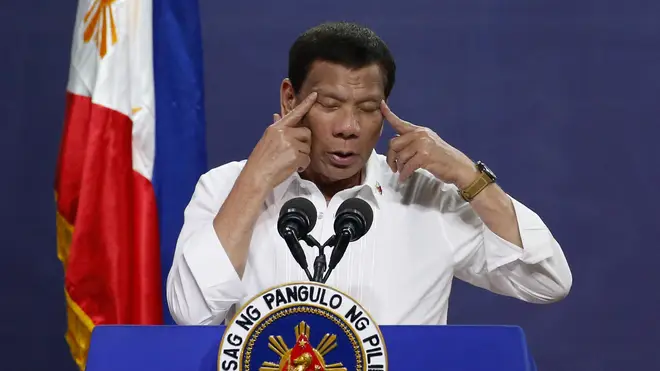
Ian Payne 4am - 7am
15 September 2021, 17:04

The court’s former prosecutor sought permission from judges earlier this year to investigate the Philippine government’s campaign.
International Criminal Court (ICC) judges have authorised an investigation into the Philippines’ deadly “war on drugs” campaign, saying the crackdown “cannot be seen as a legitimate law enforcement operation”.
The court’s former prosecutor, Fatou Bensouda, sought permission from judges earlier this year to investigate the Philippine government’s campaign.
She said that a preliminary investigation she began in February 2018 found “a reasonable basis to believe that the crime against humanity of murder has been committed” in the Philippines between July 1 2016 and March 16 2019, the date the Philippines withdrew from the court.

In a written decision, judges who considered Ms Bensouda’s request found a “reasonable basis to proceed with an investigation” into killings committed throughout the Philippines as part of the war on drugs, saying they appeared to amount to a crime against humanity under the court’s founding statute.
The court said in a statement that the judges ruled that “based on the facts as they emerge at the present stage and subject to proper investigation and further analysis, the so-called ‘war on drugs’ campaign cannot be seen as a legitimate law enforcement operation, and the killings neither as legitimate nor as mere excesses in an otherwise legitimate operation”.
They added that “the available material indicates, to the required standard, that a widespread and systematic attack against the civilian population took place pursuant to or in furtherance of a state policy”.
The judges also included in the scope of the investigation killings in the Davao area from November 1 2011, the date the Philippines joined the ICC, to June 30 2016. Philippine president Rodrigo Duterte is the former mayor of Davao.

When Mr Duterte announced he was withdrawing his country from the court, he defended the campaign as “lawfully directed against drug lords and pushers who have for many years destroyed the present generation, especially the youth”.
More than 6,000 mostly poor drug suspects have been killed, according to government announcements, but human rights groups say the death toll is considerably higher and should include many unsolved killings by motorcycle-riding gunmen who may have been deployed by police.
Mr Duterte has denied condoning extrajudicial killings of drug suspects although he has openly threatened suspects with death and has ordered police to shoot suspects who dangerously resist arrest.
When Ms Bensouda announced she had asked for authorisation to investigate, Mr Duterte’s spokesman, Harry Roque, called the move “legally erroneous”, saying the ICC, as an international court of last resort, could only intervene if a country’s judiciary and prosecutorial system failed to work and investigate domestic crimes.
Mr Roque cited many pending murder and other cases involving the government’s campaign against illegal drugs which were being tried by Philippine courts.
Human Rights Watch welcomed the announcement.
“The International Criminal Court’s decision to open an investigation into brutal crimes in the Philippines offers a much-needed check on president Rodrigo Duterte and his deadly ‘war on drugs’,” Carlos Conde, the rights group’s senior Philippines researcher, said.
“Victims’ families and survivors have reason to hope that those responsible for crimes against humanity could finally face justice.”
Ms Bensouda has since left the court and been succeeded by British lawyer Karim Khan.